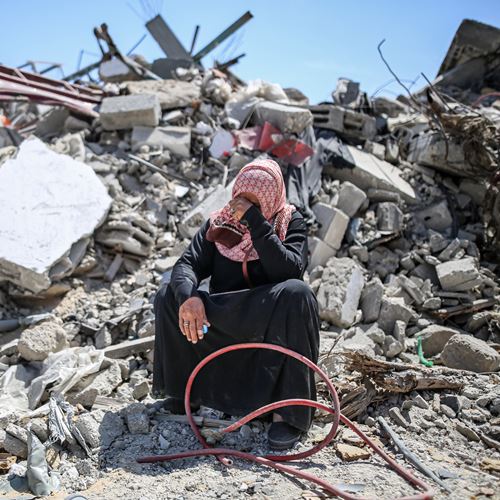News
PRESS RELEASE: ‘Blood aid’ and repeated mass displacement create catastrophic humanitarian crisis in Gaza
New survey: 70 percent are too weak from starvation to access aid; alarming signs of mental health distress among Palestinians in Gaza

Copenhagen, 5 August 2025 – A new survey of Palestinian living in Gaza by the Danish Refugee Council (DRC) reveals a harrowing nightmare in Gaza, where a population exhausted by extreme hunger and multiple displacements is being systematically denied safe access to aid.
Based on protection monitoring interviews with people in Gaza from 22 May to 27 July 2025 in 25 displacement sites in Deir al-Balah, Khan Younis, Gaza City and North Gaza, the survey exposes the life-threatening consequences of the American and Israeli-backed distribution scheme and the severe psychological toll on a population with no safe haven. Key findings from the survey show a population at breaking point.
A staggering 70 precent of respondents cited extreme weakness caused by starvation as a barrier to accessing aid. The physical exhaustion is so profound that many are unable to make the long journey on foot to distribution sites or carry heavy loads even if they receive assistance.
Palestinians trying to access the militarized backed distribution scheme said they witnessed people, including family members, being deliberately targeted, shot, and killed by soldiers. Family members who died seeking aid were described as receiving "blood aid", or "aid soaked in blood."
The 39 people interviewed – 22 women and 17 men – were displaced an average of nine times since October 2023, with one person reporting being forced to move 12 times. Meanwhile, basic services were very limited or non-existent at displacement sites: 46 percent reported receiving clean drinking water twice a week at their current locations, and 28 percent said they could get a hot meal from a communal kitchen just once a week. Notably, 31 percent (12 people) reported receiving no services in the month before being interviewed.
The protection monitoring survey paints a devastating mental health crisis, with Palestinians in Gaza describing feelings of constant fear (33 percent), depression (31 percent), sleeplessness and nightmares (31 percent), and anxiety (26 percent). In 13 percent of cases, respondents described feelings of hopelessness and suicidal thoughts. At least five people showed signs of traumatic stress. One male respondent stated (Khan Younis, 12 July): "I can’t stop thinking about what I saw: Tanks in the streets, people running, tents burning, children screaming. It’s stuck in my head. I keep replaying it over and over. Even now, I jump at every loud sound.”
The DRC condemns the continued violence and deprivation, which have systematically eroded the coping capacities of communities in Gaza. We call for an immediate ceasefire and urge the international community to take decisive action to protect civilians and ensure that humanitarian aid is delivered safely and at scale through a principled, UN-led response.
Data and testimonies: Full report available on request.
Quotes
"The American-Israeli aid is a blood-aid. My wife's brother lost his life when he went to receive aid." (Male respondent, Gaza City, 21 June 2025)
"I’m dizzy, weak, suffocating. I want to run away. I keep praying to die." (Female respondent, Deir el Balah, 26 July 2025)
“There is no such thing as security anywhere in the Gaza Strip. Our situation is difficult. We are dead and still breathing.” (Male respondent, North Gaza, 22 May 2025)
“We even received a displacement order, but I can’t leave. We have no money, no transportation, and no empty space to relocate to. These days are the hardest since the war started.” (Female respondent, Middle Area, 22 July 2025)
“The road there [to the Israel-backed distribution site] is dangerous. It’s far, and you have to walk a long way. Sometimes there’s shooting nearby, or soldiers up high.” (Male respondent, Khan Younis, 23 June 2025)
“The constant sounds of the hovering planes make me feel unsafe. I am trying to protect my family, reassure the children and keep them safe.” (Male respondent, Khan Younis, 22 May 2025)
“Death was everywhere. Drones were in the sky… I couldn't leave immediately when the displacement orders happened. I didn't have transportation, money, or people to help me evacuate… so it was really hard and dangerous for me.” (Female respondent, Khan Younis, 26 May 2025)
“My grandsons went to the hub…There was a tank standing right there clear for everyone to see. As long as that tank is in place, no one dares to move. No one tells you when it’s safe. People just wait, lying flat in the sand, because the gunfire doesn’t stop. My boys told me they saw people shot... some didn’t get up. Others were screaming for help, and no one could help. Then suddenly, they’re told to go and they run…They run with all their strength, just to reach the aid before it’s gone.” (Male respondent, Khan Younis, 26 June 2025)


